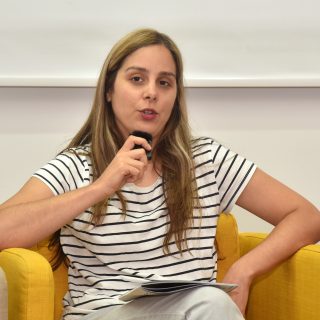Memories lie, women don’t. it is not true that only winners write history. History is written by men in power.
During a war, women become second-class citizens and their role is split between somber duties in preserving daily life and their social and political position: a sharp division line splits heroes and non heroes, the so-called patriots and the traitors.
Three words describe this model of women in war, especially in a nationalist war: instrumentalisation, traditionalisation, and naturalisation. In a split second, society becomes totemic. The masculinity of men and the subjection of women is radicalised. Women become angels-in-the-home who must support their men, and women take over all civilian duties, at home and in public, while men are on the front defending the fatherland. Once the men return home, traumatised, whether winners or losers, the bodies of women are their territory, a motherland of healing. Women’s bodies are a battleground, where rape becomes a tool to harm the enemy. The Hague Tribunal declared rape a war crime, after feminists, from all over the world, fought for that law.
Women who fail to obey the new war rules become demonised, and are called traitors and/or witches. As a consequence, it is mostly women who are active pacifists. Women hide deserters, do the “dirty” job of providing daily bread, of collaborating with the “enemy” women, who also speak out against wars and nationalist regimes, while they clean the garbage of their own back yard and own country.
Since the second feminist wave in the twentieth century, women have valued and collected their differing, non-official narratives of historical events, especially stories of crime, violence and justice… whether in war or in peace. As a writer, as a feminist, I always wanted to add my view to the evident failures of mainstream writing. The Other side of an unjust event: that would be my inspiration. I disbelieve in “inspiration” otherwise: if you have nothing to say, then don’t write, that’s my motto.
I will tell you a true story I followed live during the war in former Yugoslavia, about a girl I met in the 1990s.
She was a young girl: living with in Bosnia with her parents and her brothers. When the war started, her brothers went to fight, without any question. The brothers joined other troops of their ethnic group and bombed their own town, including the neighborhood where their own family still lived.
This girl spent months on end in the basement during those raids, together with her family and others. Then, a different ethnic army seized her neighborhood and she was gang raped by the soldiers, who were neighborhood boys, men she knew.
Unfortunately, she became pregnant, and in those conditions, she had nothing to do about it. When her father noticed her belly growing, he decided her shame was unbearable. So she had no choice but to flee for the sake of decency, in the middle of artillery shellings. She just ran across the fire-zone, crossed a dividing line among ethnic groups, and found fellow ethnics who didn’t know her own family.
She managed to survive and safely deliver the baby. Before her child was born, she got a message from her father: if it is a boy, you can come back home, if it is a girl, no way. The girl was very emotionally dependent on her family, especially her mother, she was only nineteen. She kept repeating: I don’t want to be the mother, I want my mom.
She delivered a girl. She immediately gave her up for adoption in order to return home. She did not even look at the infant, and went back through the fire, back to her mom, still in the war zone.
But after few months of chaos and nightmares, she felt a strong sense of guilt and decided to go and somehow get her baby back. Once again, she crosses the fire line. Then, with the help of some women friends, she managed to retrieve her baby and live almost as a normal mother, for a couple of months.
But one night, her girlfriend, who came to visit, found her standing on the ledge of her window, in a high-rise, five stories up.
Dissuaded from suicide, the girl explained what happened: “The moon was shiny and full , lighting the face of my sleeping baby girl. There is nothing more beautiful than a baby peacefully asleep. I looked at her face and then all of a sudden, I saw the face of my neighborhood rapist. Finally, I knew which member of that gang was the father. The person I loved most, my baby girl, became the person I hated most. I could not stand that split, which I realized would last forever. I couldn’t kill my baby, so I decided to kill myself.”
Another true story to remember, this one is my own:
“In December 2005, I first attended the Srebrenica trial of the Scorpion paramilitaries. I went to support our women friends from Bosnia, who came to testify at this war crimes tribunal, and to identify their murdered loved ones. I went as a member of the Non-Governmental Organization ‘Women in Black.’
When I first heard the Scorpions speaking publicly, these men who had secretly participated in the Srebrenica massacre as well as other, lesser-scale mass-killings, I decided to stay until the trial’s end. Not merely for the sake of the victims, but because of the criminals.
Those people spoke in my own language. They had the gestures and body-language of my own neighbors, and the reasoning of my own family. They were part of my family story and my history, the part which went bad, astray. They committed crimes, killed and obscured the killing. My duty, which was also my privilege, was to hear them at first hand, to take notes and try to convey some historical truth.
What kind of obscurantism and denial could make eight thousand victims vanish from history? All ‘operated’, all killed, in a three-day massacre? What design could execute such a crime? Looking at and listening to the Scorpions, these ‘heroes’ in their own minds, whose turbulent war years passed as an ethnic militia, as underworld looters, covert killers of their neighbors, who then sank into frustrated years of peace as an aging brotherhood-in-blood, a small-scale, patriarchal mafia… I wrote a book struggling to make sense of that experience, to respect the words and thoughts of the actors in the court, and to convey a bigger picture to the world.
Every time we read a story, it is different story. Every time we write a story it tells a different story. That is why we have to write the memories immediately, make a diary web of alternative history through daily memories of the passing of the years…
Since stories change together with memories as time goes by, writing them over and over is necessary, writing the same yet different book, like Proust’s Remembrance of Lost Times, in search of lost times, living in truth.
Jasmina Tešanović (1954, Belgrade) is a feminist and political activist (Women in Black; CodePink), writer, journalist, musician, artist, translator, and film director. She designed and created the first feminist publishing house in the Balkans, Feminist 94. She has been publishing her works on blogs and other media, always connected to the Internet. She writes in three languages and lives between Turin, Belgrade, Austin, and Ibiza.




